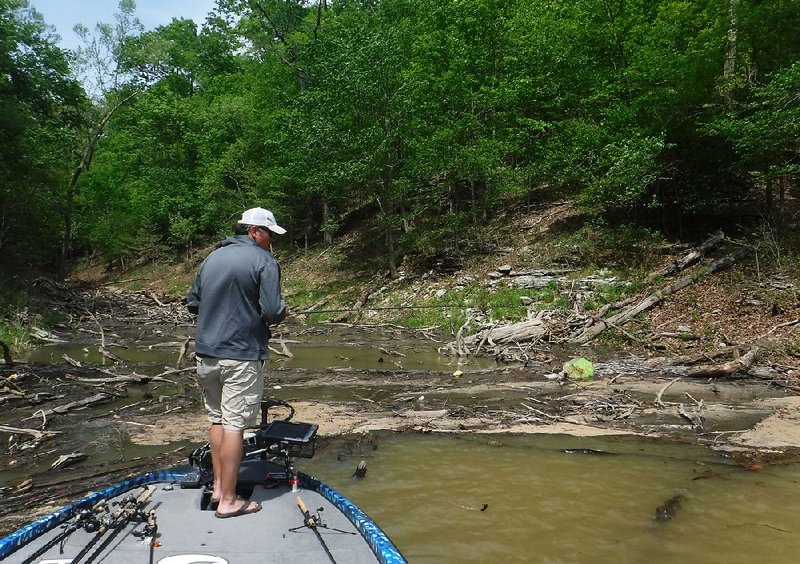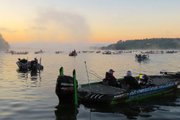Even for amateurs, fishing a major bass tournament is hard work.
I thought I knew a lot from decades of covering tournaments, but fishing as a co-angler in the Fishing League Worldwide tournament at Beaver Lake on April 27-30 showed me how much preparation and effort touring pros devote to their profession.
For the record, I finished 105th out of a field of 148 co-anglers. I caught two bass that weighed a total of 4 pounds, 6 ounces. I wanted to win, and I wanted to earn a check, but a lot of things have to fall just right for a co-angler to do either of those things. In the end, I was just happy to walk across the stage with bass to weigh both days.
My pro partners were Mark Fisher of Wauconda, Ill., and Bob Morin of Seymour, Tenn. They were as nice and as gracious as they could be, and it was a pleasure to spend a day with them.
Socially, FLW's pro anglers fall into two strata. The full-timers are the backbone of the tour, the elite. Fishing is their only vocation, and they consistently perform the best and make the most money.
The second strata is composed of people that make enough money in other professions to bankroll their pursuit of bass fishing glory. They are very successful fishing in local and regional circuits near their homes, and they want to prove that they are good enough to compete at the highest level.
Almost every pro has an alpha personality. They are very competitive and highly motivated.
Fisher is a principal at a high school for special needs children. He's nearing retirement age, so that part of his career is winding down, he said. Professional bass fishing is the next stage of his life.
"My name is Fisher, so I guess you could say I was destined for it," Fisher said.
Morin is a contractor that put fishing on hold for 20 years to raise a family.
"I was a pretty good 'stick' in my 20s, but you can't fish tournaments and have enough money to have babies at the same time," Morin said.
When his children completed their educations, Morin went back to fishing.
Fisher paid his dues as a co-angler, so he was very patient and accommodating with a newbie. He told me how much gear to bring, when and where to meet, and how to act.
"It's not in the rules anywhere, but you should always offer to pitch in for some of the gas," Fisher said. "I won't accept your money, but you should always offer. It's expected."
Forty dollars is the customary offering.
For my part, I put Fisher and Morin at ease by letting them know that I'm a journalist out to get a story, and that I would do my best to stay out of their way.
"I'm here to make you famous," I said.
They liked that, but there's a complicated, unwritten code of conduct that governs the relationship between the pros and co-anglers. In short, it reflects well on pros if their co-anglers perform well.
On a lake like Beaver, for example, a weight of 14-17 pounds in a day is phenomenal. When an angler hits that mark, he understands that he's unlikely to improve his weight, and it is counterproductive to continue beating on fish that he'll need the next day.
When he hits a top 10 weight, the pro often leaves his main area and takes the co-angler someplace where he can catch a good weight.
One championship contender at Beaver Lake did not do that. When he hit his weight, he checked in two-and-a-half hours early and ruined the tournament for his co-angler. Word of this got around quickly, and the other pros criticized him severely.
Conversely, a co-angler can get sandbagged by a pro that doesn't have a chance of winning, but who is desperately trying to get a top-50 check. That pro is catching a lot of cookie cutter keepers, and culling up a quarter-inch or half-inch at a time. He is convinced that the next cast will produce a 5-pounder, and he pounds the water relentlessly until check-in. In that situation, a co-angler doesn't get many chances.
Sometimes, a co-angler fishes with a pro that knows and accepts he is out of the running, and he makes it his mission to help his co-angler catch fish.
Such an example occurred at the 1992 Golden Blend Diamond Invitational at Lake Tuscaloosa, Ala. That was a $150,000 payday for the winner, at a time when the Bassmaster Classic paid only $50,000.
The co-angler concept hadn't been invented at that time, but I was a media observer for a Missouri pro named Johnny Borden.
Early that morning, Borden noticed me reading a magazine.
"Why aren't you fishing?" Borden asked.
"Man, I'm not competing for 150 grand," I said.
"Did you look at the leaderboard this morning?" Borden asked. "I don't have a snowball's chance in hell of winning this tournament. Grab yourself a rod and have some fun."
Co-anglers must abide by a few rules. First, he must mark his fish to distinguish them from the pro's fish. The pro and co-angler must be able to ascertain without a doubt who caught which fish.
Also, the co-angler may cast only when the pro's feet are on deck. If he steps off the deck to get a drink, snack or bait, the co-angler may not cast. If he casts and catches a fish, he may not keep the fish.
He may, however, complete a cast that started before the pro stepped off the deck.
At the weigh-in, the pro and co-angler must stay together and bag their fish together. The pro confirms that the co-angler has the correct fish in the bag, and then they accompany each other to the check-in tent.
They sign a check-in slip and then take their places in line to the stage. Under the tent are tanks filled with an additive to help ensure the health of the fish. Each tank has oxygenated tubes with aerator stones on the ends that you put inside your bag as you proceed through the line.
The last step before you go onstage is to check in your fish. They are measured and confirmed to be alive. If a fish is dead at check-in, you are assessed a weight penalty.
Then you go onstage, weigh your fish, get your weigh-in ticket and hand your bag to a stagehand that takes it and the fish to a live-release boat. The fish are then released alive back into the lake.
At that point, the co-angler's day is finished.
The pro, on the other hand, faces a long evening of recharging deep cycle batteries, putting fresh line on reels, organizing tackle and testing equipment.
Sports on 05/07/2017

